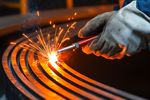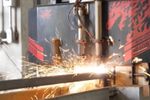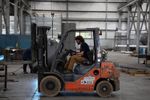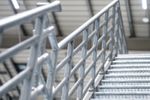In the midst of economic turbulence, metal fabricators and other manufacturers often turn to their “lean” roots to keep their operations steady and moving forward.
Unlike many companies that react by simply cutting costs, industrials take a more agile approach to weather a crisis, including:
- Responding quickly and effectively to their customer demands
- Finding ways to bring successful new products to market faster
- Responding more quickly to sudden changes in the manufacturing environment
According to IndustryWeek, what manufacturers do not want to do is panic and react without a plan. A good first step is to evaluate all current operational structures and evaluate the viability of those structures during times of crisis, such as a global pandemic. Any changes in operations should be clearly communicated to the entire organization.
This information can give operators and supervisors the ability to see if they’re in control over their own processes and address their problems swiftly. What’s more, it gives manufacturers a window to identify opportunities to eliminate waste.
Eliminate the Seven Deadly Wastes
According to the manufacturing efficiency experts at Vorne Industries Inc., understanding the lean Seven Deadly Wastes can provide a roadmap for reducing inefficiencies in labor, materials handling, and other resources.
Lean manufacturers and metal fabricators must address each “waste,” including:
- Overproduction: Are we processing more than is needed to produce what the customer requires? Can we find ways to better align our manufacturing processes with our customers’ requirements?
- Waiting: Is there a gap where staff is waiting for the next step in production? How can we ensure more continuous production flow that gives more value to our customers?
- Transport: Are we unnecessarily moving raw materials, work-in-progress (WIP), or finished goods? What can we do to create a linear flow from raw materials to finished goods?
- Motion: How can we re-organize our work flows so we don’t have unnecessary staff movement? Can we rearrange our equipment to reduce motion waste?
- Overprocessing: What are our customer requirements compared to our manufacturing specifications? What manufacturing simplifications can we make to only produce what our customers require?
- Defects: What is the single, most frequent defect and why is it occurring? Can we create a process to detect and prevent future abnormalities? How can we convey these changes to our staff?
- Inventory: How can we counter overproduction that doesn’t add customer value? Are we bringing in only raw materials that we truly need? What buffers can we eliminate between steps in production?
The lean concept of the Seven Deadly Wastes boils down to removing activities that do not add customer value. Material Resource Planning systems (MRPs) can also eliminate costly inefficiencies and improve processes to add more value.
Go Lean With Material Resource Planning
Lean-minded metal fabricators are always looking for ways to reduce waste and deliver more value to their customers.
MRP breaks down the entire production process to more effectively determine quantity requirements, run calculations, and complete orders. This approach is especially useful for push production systems, where manufacturers try to forecast demand and create products before customers actually purchase them.
From design to finishing, metal fabricators use MRP to plan for demand and synthesize those forecasts to create a detailed production schedule.
For example, Southern Metal Fabricators uses MRP to:
- Ensure proper inventory levels: MRP notifies our quality control team if there’s an impending materials shortage so we can order more materials before it becomes a problem.
- Decrease manufacturing costs: By monitoring our inventory levels and reducing component shortages, we use MRP to decrease overall manufacturing cost and we pass that cost savings on to our customers.
- Reduce manufacturing time: We’re now proactively identifying and rectifying manual material inventory errors and omissions. Therefore, MRP enables us to speed up purchasing and manufacturing time to further reduce cost, whether we’re making a custom storage bin or a set of industrial stairs.
The end result is significantly improved productivity, which enables us to fabricate more products in less time. For our customers, it allows us to more easily prevent unnecessary delays, streamline the purchasing process, and increase project efficiency through data analysis.
Want to learn more about MRP or the benefits of working with a lean-minded metal fabricator who can apply a similar system to your advantage? Contact us today, and give us a chance to say, “Yes, we can do that!”





